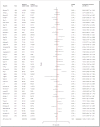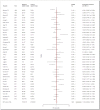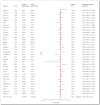Genetic polymorphisms of GSTM1, GSTT1, and GSTP1 with prostate cancer risk: a meta-analysis of 57 studies
- PMID: 23189206
- PMCID: PMC3506585
- DOI: 10.1371/journal.pone.0050587
Genetic polymorphisms of GSTM1, GSTT1, and GSTP1 with prostate cancer risk: a meta-analysis of 57 studies
Abstract
Background and objectives: The GSTM1, GSTT1 and GSTP1 polymorphisms might be involved in inactivation of procarcinogens that contribute to the genesis and progression of cancers. However, studies investigating the association between GSTM1, GSTT1 or GSTP1 polymorphisms and prostate cancer (PCa) risk report conflicting results, therefore, we conducted a meta-analysis to re-examine the controversy.
Methods: Published literature from PubMed, Embase, Google Scholar and China National Knowledge Infrastructure (CNKI) were searched (updated to June 2, 2012). According to our inclusion criteria, studies that observed the association between GSTM1, GSTT1 or GSTP1 polymorphisms and PCa risk were included. The principal outcome measure was the odds ratio (OR) with 95% confidence interval (CI) for the risk of PCa associated with GSTM1, GSTT1 and GSTP1 polymorphisms.
Results: Fifty-seven studies involving 11313 cases and 12934 controls were recruited. The overall OR, which was 1.2854 (95% CI = 1.1405-1.4487), revealed a significant risk of PCa and GSTM1 null genotype, and the similar results were observed when stratified by ethnicity and control source. Further, the more important is that the present study first reported the high risks of PCa for people who with dual null genotype of GSTM1 and GSTT1 (OR = 1.4353, 95% CI = 1.0345-1.9913), or who with GSTT1 null genotype and GSTP1 A131G polymorphism (OR = 1.7335, 95% CI = 1.1067-2.7152). But no association was determined between GSTT1 null genotype (OR = 1.102, 95% CI = 0.9596-1.2655) or GSTP1 A131G polymorphism (OR = 1.0845, 95% CI = 0.96-1.2251) and the PCa risk.
Conclusions: Our meta-analysis suggested that the people with GSTM1 null genotype, with dual null genotype of GSTM1 and GSTT1, or with GSTT1 null genotype and GSTP1 A131G polymorphism are associated with high risks of PCa, but no association was found between GSTT1 null genotype or GSTP1 A131G polymorphism and the risk of PCa. Further rigorous analytical studies are highly expected to confirm our conclusions and assess gene-environment interactions with PCa risk.
Conflict of interest statement
Figures
Similar articles
-
Glutathione S-transferase gene polymorphisms (GSTM1, GSTT1, GSTP1) and prostate cancer: a case-control study in Tehran, Iran.Prostate Cancer Prostatic Dis. 2011 Jun;14(2):105-13. doi: 10.1038/pcan.2010.54. Epub 2011 Jan 18. Prostate Cancer Prostatic Dis. 2011. PMID: 21243008
-
Individual and combined effects of GSTM1, GSTT1, and GSTP1 polymorphisms on breast cancer risk: A meta-analysis and re-analysis of systematic meta-analyses.PLoS One. 2020 Mar 10;15(3):e0216147. doi: 10.1371/journal.pone.0216147. eCollection 2020. PLoS One. 2020. PMID: 32155154 Free PMC article.
-
GSTM1 Null Genotype and GSTP1 Ile105Val Polymorphism Are Associated with Alzheimer's Disease: a Meta-Analysis.Mol Neurobiol. 2016 Mar;53(2):1355-1364. doi: 10.1007/s12035-015-9092-7. Epub 2015 Jan 30. Mol Neurobiol. 2016. PMID: 25633095
-
Association of genetic polymorphism of glutathione S-transferase (GSTM1, GSTT1, GSTP1) with bladder cancer susceptibility.Urol Oncol. 2013 Oct;31(7):1193-203. doi: 10.1016/j.urolonc.2011.11.027. Epub 2011 Dec 11. Urol Oncol. 2013. PMID: 22154357
-
An updating meta-analysis of the GSTM1, GSTT1, and GSTP1 polymorphisms and prostate cancer: a HuGE review.Prostate. 2009 May 1;69(6):662-88. doi: 10.1002/pros.20907. Prostate. 2009. PMID: 19143011 Review.
Cited by
-
MicroRNAs, Hypoxia and the Stem-Like State as Contributors to Cancer Aggressiveness.Front Genet. 2019 Feb 20;10:125. doi: 10.3389/fgene.2019.00125. eCollection 2019. Front Genet. 2019. PMID: 30842790 Free PMC article. Review.
-
The association between the GSTP1 A313G and GSTM1 null/present polymorphisms and the treatment response of the platinum-based chemotherapy in non-small cell lung cancer (NSCLC) patients: a meta-analysis.Tumour Biol. 2014 Jul;35(7):6791-9. doi: 10.1007/s13277-014-1866-4. Epub 2014 Apr 12. Tumour Biol. 2014. PMID: 24729086
-
Association of Androgen-Receptor Gene Mutations with the Copy Number of Androgen-Receptor Silk Protein A Complex and Glutathione-S-Transferases T1 and M1 in Prostate Cancer Patients.Genet Res (Camb). 2023 Feb 14;2023:5956951. doi: 10.1155/2023/5956951. eCollection 2023. Genet Res (Camb). 2023. PMID: 36824501 Free PMC article.
-
GSTM1 null genotype is a risk factor for laryngeal cancer.Int J Clin Exp Med. 2015 May 15;8(5):7661-6. eCollection 2015. Int J Clin Exp Med. 2015. PMID: 26221314 Free PMC article.
-
The Leucocyte Telomere Length, GSTM1 and GSTT1 Null Genotypes and the Risk of Chronic Obstructive Pulmonary Disease.Curr Issues Mol Biol. 2022 Aug 20;44(8):3757-3769. doi: 10.3390/cimb44080257. Curr Issues Mol Biol. 2022. PMID: 36005153 Free PMC article.
References
-
- Jemal A, Siegel R, Ward E, Murray T, Xu J, et al. (2006) Cancer statistics. CA Cancer J Clin 56: 106–130. - PubMed
-
- Greenlee RT, Hill-Harmon MB, Murray T, Thun M (2001) Cancer statistics. CA Cancer J Clin 51: 15–36. - PubMed
-
- Parkin DM, Bray F, Ferlay J, Pisani P (2002) Global cancer statistics. CA Cancer J Clin 55: 74–108. - PubMed
-
- Fleshner N, Zlotta AR (2007) Prostate cancer prevention: past, present, and future. Cancer 110: 1889–1899. - PubMed
-
- American Cancer Society: Cancer Facts & Figures 2009. 2009.
Publication types
MeSH terms
Substances
LinkOut - more resources
Full Text Sources
Medical
Research Materials
Miscellaneous





